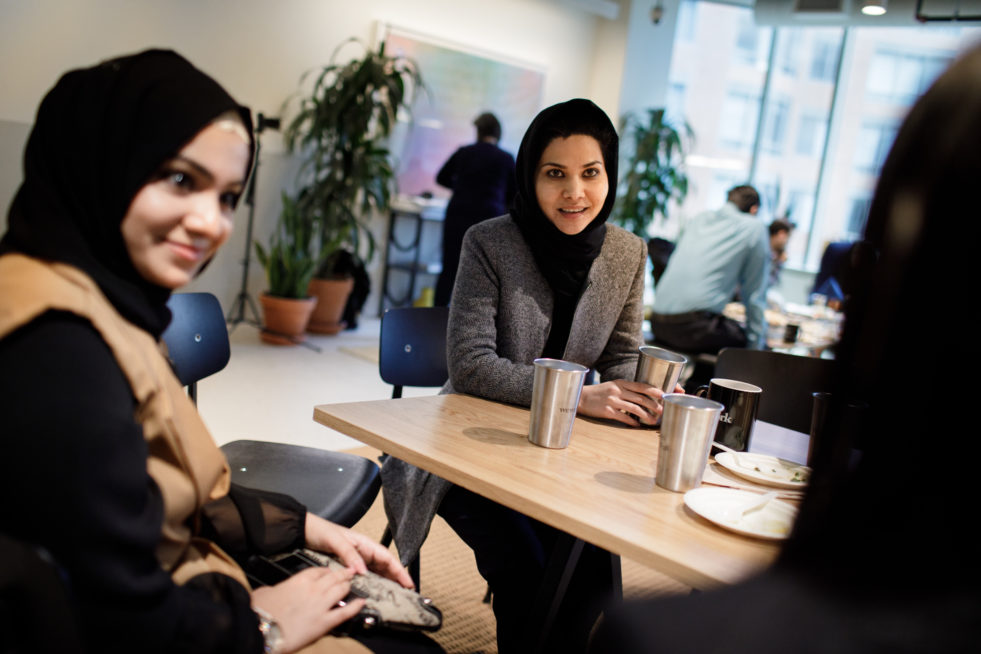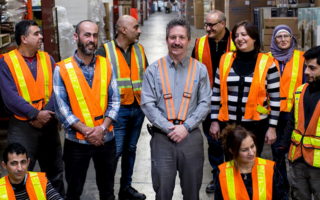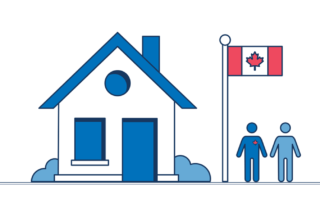
Mentors and mentees talk as part of a “Speed Mentorship” session at Wework co-working space in downtown Toronto, Canada. © UNHCR/Annie Sakkab
With the support of Canadian mentors, refugees learn how to get started on the local job market
By Rana Khan in Toronto, Canada
For newly arrived refugees, finding a job is an important part of integrating into a new community, and it can give them a renewed sense of autonomy. Refugees come with skills and experience that significantly contribute to improving the societies that welcome them. In fact, half of refugees working in Canada are employed in skilled professions, including management and trades.
But it can be challenging to break into the Canadian job market, and organizations like Jumpstart – Refugee Talent and the Toronto Region Immigrant Employment Council (TRIEC) have turned to mentorship to help refugees successfully join the workforce. “When we think about refugees, we often think about their tragic stories first, but we forget that they’re also engineers, doctors and farmers,” explains Mustafa Alio, Jumpstart’s Managing Director. “We sometimes overlook their contribution to society and their role as a true economic power.”
“When we think about refugees, we often think about their tragic stories first, but we forget that they’re also engineers, doctors and farmers”
Both organizations have created programmes where refugees are paired with Canadian mentors who share similar educational and work backgrounds. Refugees learn to understand local workplace culture and navigate the professional landscape to enter and advance in the Canadian labour market. Mentors provide practical advice to their mentees, from how to craft a resume that catches the attention of employers to interview techniques.
Last year, UNHCR, Jumpstart and TRIEC organized an event that took a closer look at mentorship and allowed participants to share their own stories. “Tricia taught me to look employers in the eyes and to speak up and find my voice,” explained mentee Saheed Oyinola. “She made me realize that I need to believe in my work experience, even if I don’t have experience in Canada. I learned that volunteering can also count towards work experience.” Riza Kahriman also testified that his mentor provided guidance that improved his self-esteem. “Working with Gary helped me build self-confidence and recognize my own skillsets,” he said.
Mentors spoke about how much they have also gained from this initiative. For some, the motivation to become a mentor was rooted in their own journeys as newcomers to Canada. Remembering how much she struggled when she first came to Canada herself, Ashanthi Jayasena said that “it’s a great feeling to share something that you know with someone who’s new to the country.” Another participant, Ola Midani, indicated that mentoring helped her develop her own professional and coaching practice.
A key aspect of mentorship is the ability to foster connections between refugees and their mentors’ broad network of contacts in Canada. Setting up “coffee dates” with former colleagues, attending dinners with relatives – these small actions can prove incredibly useful to refugees. “When people meet and chat, it breaks barriers – and that’s when the magic happens,” concludes Mustafa Alio. “You have this intimate feeling that you now have someone to talk to, someone who understands you.”





